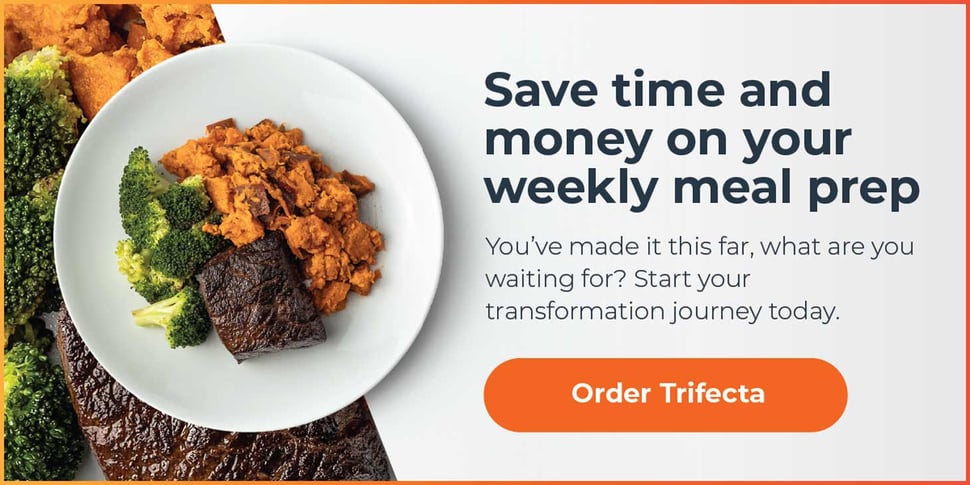Dairy is everywhere, even when you’d least expect it! From your morning coffee to cooking our most classic recipes, milk has found its way into every meal of the day. Dairy is any product made from the milk of a mammal. Cow’s milk is the number three most produced food product in America, bested only by two foods grown largely to feed the dairy cows that make the milk; corn and soybeans (1).
Dairy is high in protein, high in nutritious vitamins and minerals and contains important cultures. In modern cooking, dairy is used as a stabilizer in baking, a fat for frying, to richen sauces, to cool spices, and form sweet desserts. Dairy is indispensable in nearly every regional cuisine of the world. But not irreplaceable.
For practical reasons - cultural, environmental, dietary - humans have been finding alternatives to satisfy our dairy dependency for centuries. Plant-based products can replicate the flavor, nutrition and cooking science of dairy products while improving one’s diet and offering an alternative to those with intolerances. If you’re trying to lose weight, are lactose intolerant or choosing to eliminate animal products from your lifestyle, these dairy alternatives will give you all the benefits of milk. No cow required.
What are Dairy Alternatives?
Dairy alternatives are any food that mimics a product derived from milk, including:
Plant-based products are most often made from beans, nuts and seeds, soaked and blended into water to extract properties similar to milk. Like cow, buffalo, sheep or goat’s milk, plant-based milks contain, proteins, fats, vitamins, minerals, and calories. And their uses in the kitchen can be surprisingly similar too.
Benefits of Dairy Alternatives
Environmental
Arguably the most significant advantage of dairy substitutes is their carbon intensity relative to milk produced by livestock. Worldwide, livestock accounts for more than 15% of global greenhouse gas emissions, much of it the responsibility of the dairy industry (2). Deforestation compounds the impact as carbon-absorbing trees are cleared to create grazing land for the livestock.
By limiting animal products from your diet, you help stop the acceleration of land loss and emissions by lowering the demand for these valuable products. Dairy alternatives also tend to have longer shelf life which cuts down on food spoilage and waste.
Ethical
Many choose to abstain from animal products for macro considerations like the climate as well as on a micro level regarding ethically raised.
Trifecta is proud to work with farmers that earn a prestigious background in treating their animals humanely. In an era of industrial agriculture and complex supply chains, ensuring the animal products you consume on a daily basis are raised ethically is very difficult and many choose to simply not eat any at all.
Health
Humans are the only species that consumes milk after infancy and some would argue that our bodies may not be adapted to the practice. A majority 65% of humans worldwide have a reduced ability to digest lactose, the sugar found in milk, beyond infancy (3).
One study found that in regions of the world where raising livestock was historically difficult, people are more intolerant of lactose than areas where cows and sheep could be raised relatively easily (4). In its place, ancestrally and today, humans have found an alternative in plants.
Cutting out high fat dairy products is also an easy way to cut back on saturated fat intake!
Diet
Some dairy substitutes contain far fewer calories and less saturated fat than their animal alternatives, making them an easy way to cut back on your caloric intake if you’re trying to lose weight.
Unsweetened, plant based dairy also tends to be low in carbs. Just be sure to check the nutrition facts and ingredients label to make sure you are getting decent nutrition and aren't getting options with added sugars and other unwanted ingredients.
Milk Alternatives
1. Soy Milk
The most well-known dairy alternative is soy milk. Originating as a broth in China around the fifth century, soy milk has become a staple around the world due to its similar appearance, taste, mouthfeel and nutrition to animal milk(5).
Soy milk is high in complete proteins, containing all essential amino acids rarely found in plants. It’s also a great source of potassium. In fact, it is one of the few dairy free options that is naturally high in protein, making it a comparable nutrition choice.
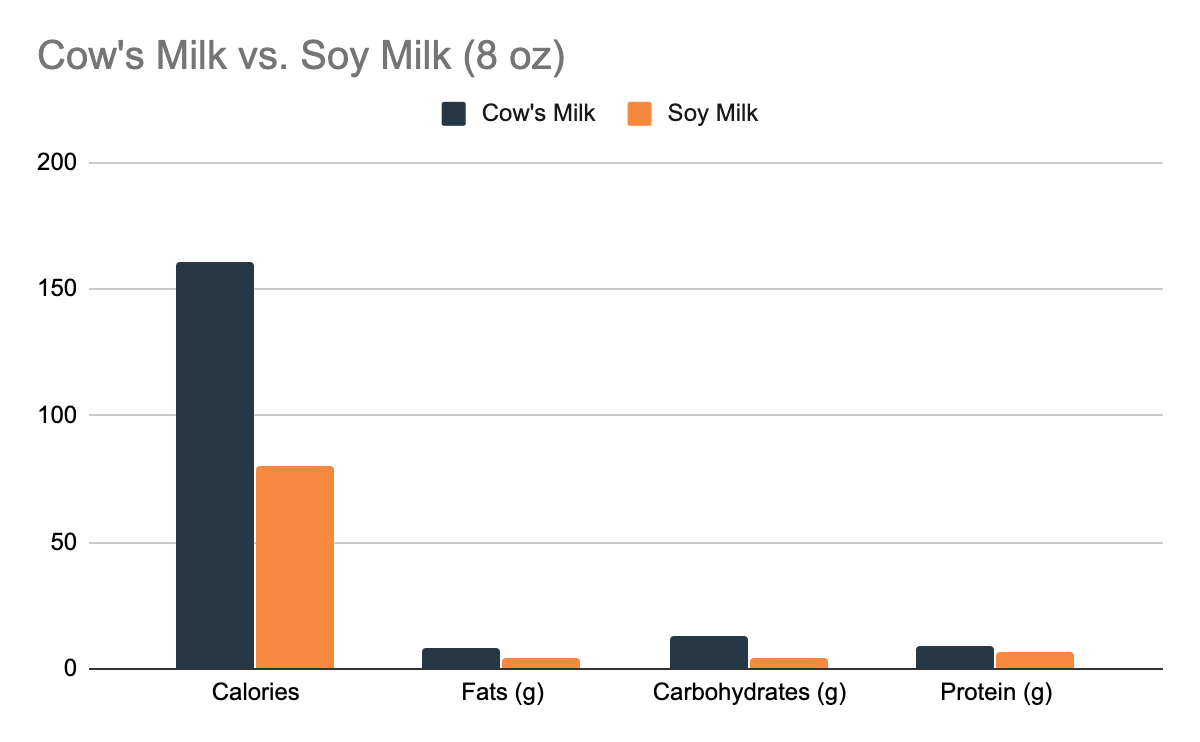
161 calories, 8g F, 13g C, 9g P (6) vs. 80 calories, 4g F, 4g C, 7 g P (7)
2. Oat Milk
The oat’s you find steel cut in the store are actually the seeds of the oat plant, a grain similar to wheat. These seeds are the basis of oat milk. Oat milk is high in vitamins like B12 and a good source of fiber.
Oat milk has one of the most satisfying flavors, with a creamy texture that replicates the richness of cow’s milk.
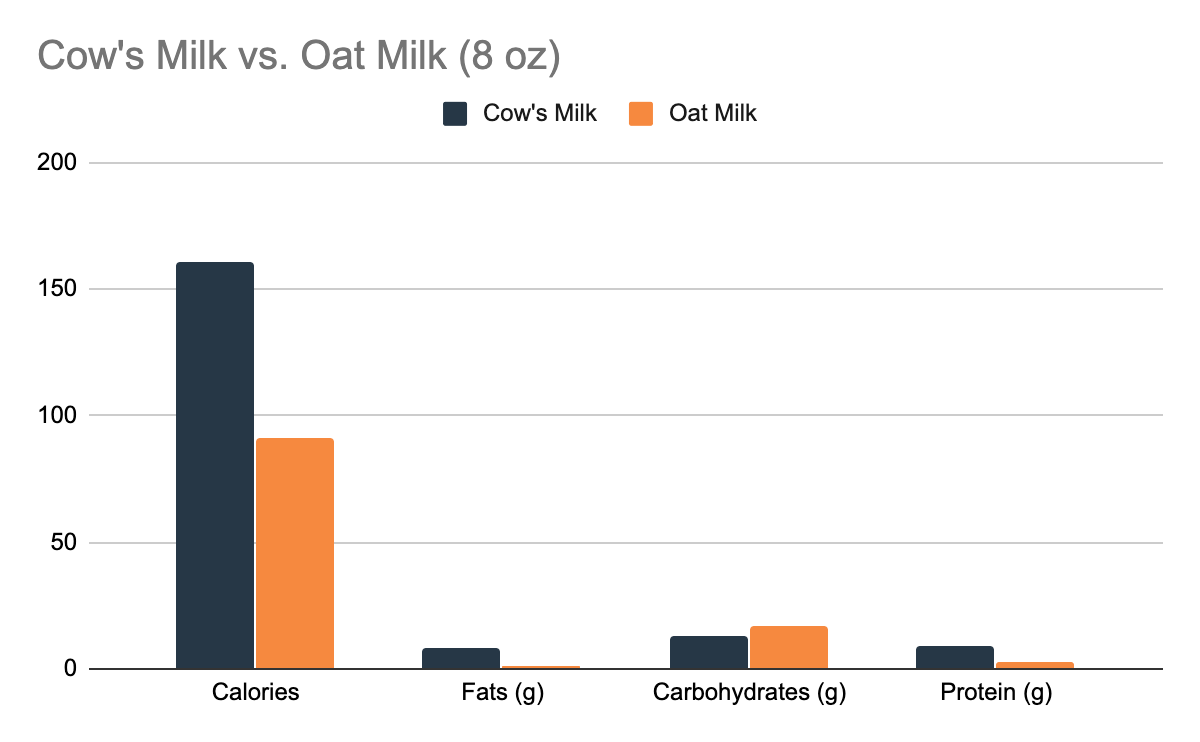
161 calories, 8g F, 13g C, 9g P (8) vs. 91 calories, 1.5g F, 17g C, 3g P (9)
3. Almond Milk
Almond milk is another popular dairy substitute due to the popularity of almonds. Almond milk is low in sugar and has a mild flavor that won’t stand out - making it an excellent low calorie and low carb alternative.
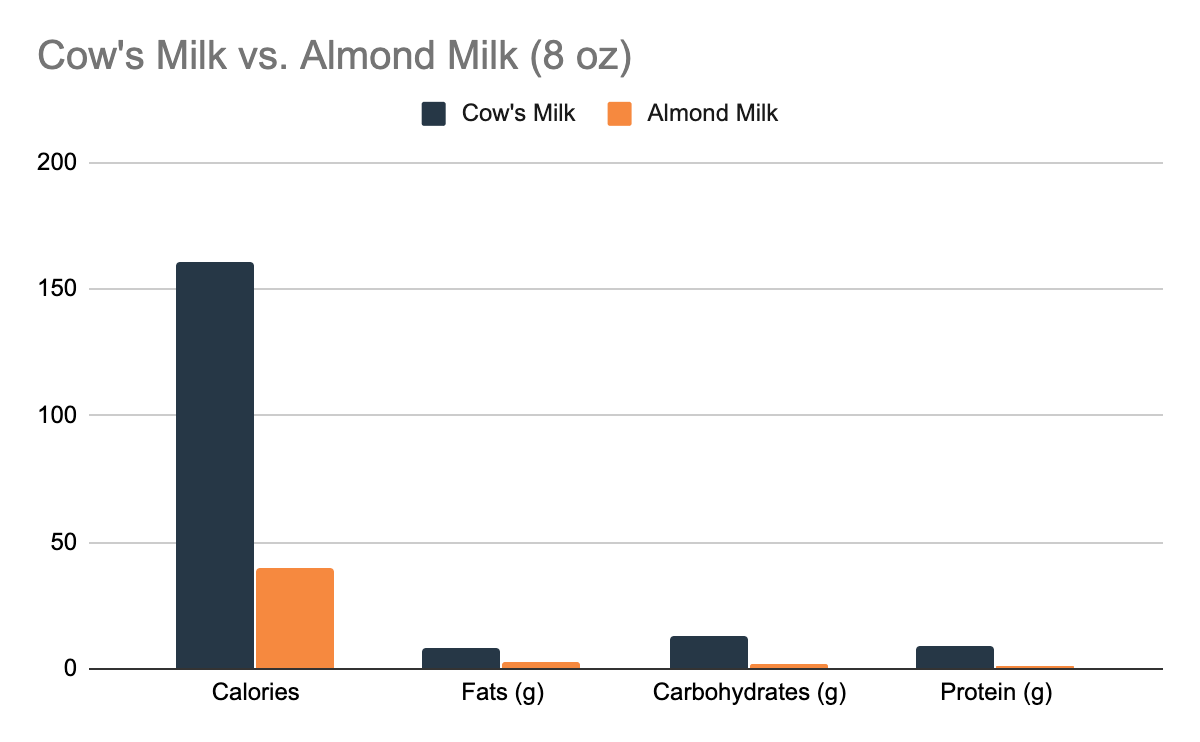
161 calories, 8g F, 13g C, 9g P (10) vs. 40 calories, 3g F, 2g C, 1g P (11)
4. Hemp Milk
Since the 2018 farm bill legalized hemp horticulture in the United States, byproducts of the plant have been growing in popularity.
Made from the hulled seeds of genetically male hemp plants, hemp milk offers worthy nutritional benefits. Like soybeans, hemp seeds are a source of complete proteins with all essential amino acids as well as healthy fats.
Hemp is a sustainable crop, using far less water than almonds, requiring little to no pesticides, and contributing to the health and stability of topsoil.
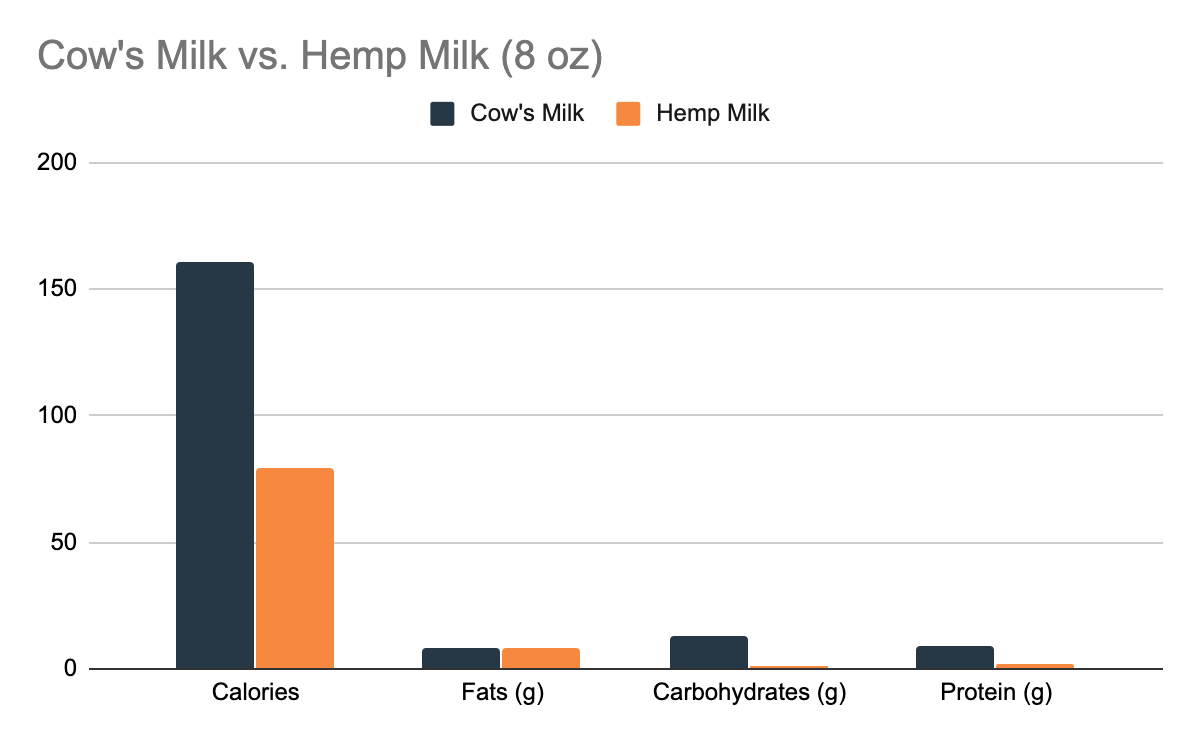
161 calories, 8g F, 13g C, 9g P (12) vs. 79 calories, 8g F, 1g C, 2g P (14)
Yogurt Alternatives
5. Coconut Yogurt
Coconut yogurt is a rich treat that’s easy to make at home. Simply using whole fat coconut milk and a probiotic capsule, you can have creamy yogurt that has the same consistency and cultures as yogurt from cow’s milk.
Coconut yogurt contains small amounts of medium-chain triglycerides (MCTs) perfect for a keto diet. However, coconut milk is not a natural source of protein like cow’s milk - you can enhance this low protein alternative with hemp seeds or high protein granola.
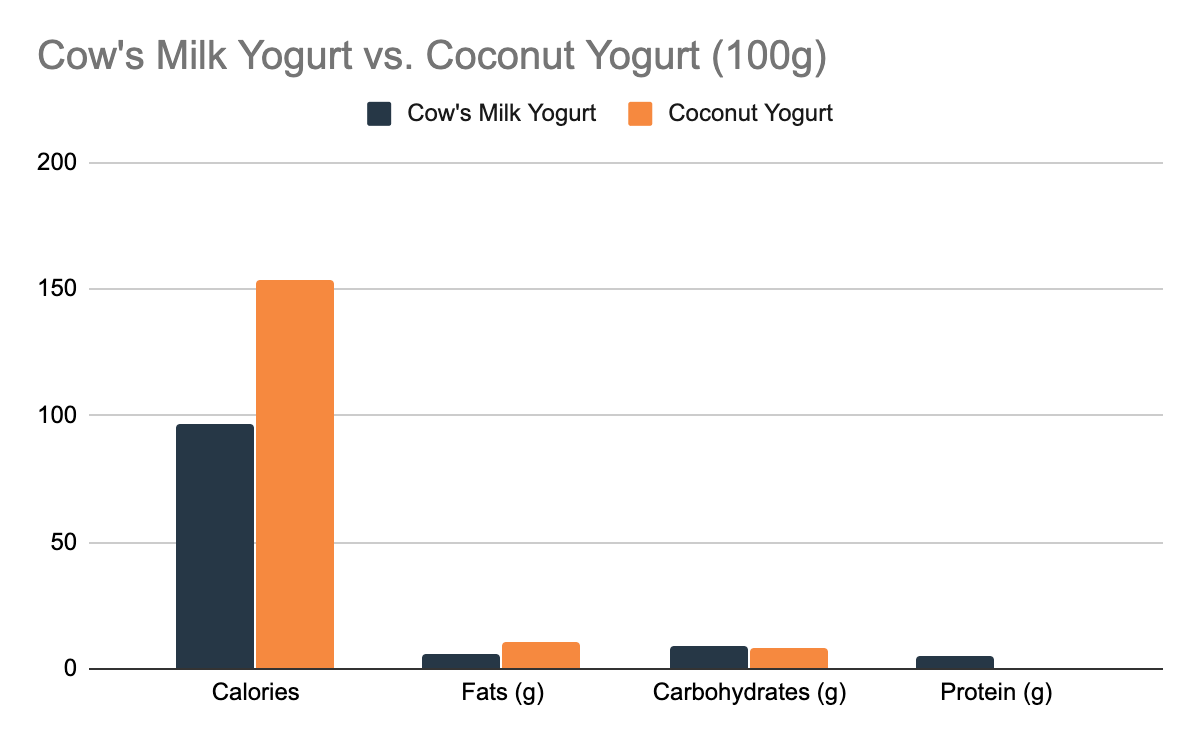
97 calories 5g F 9g C 5g P (15) vs. 154 calories, 11g F, 8 g C, 0g P (16)
Butter Alternative
6. Extra Virgin Olive Oil
Butter and olive oil are remarkably interchangeable and the dividing line between some of the world’s most famous cuisines. French cooking is all about butter, lots of it, while the roots of Italian cuisine are olive.
Olive oil is great for frying, dipping, basting and baking (except for recipes calling for cold butter).
Olive oil is full of heart healthy monounsaturated fat. Diets high in monounsaturated fats, like the Mediterranean diet, are associated with a wide range of health benefits including weight management, improved cholesterol, and lowered blood pressure (17,18,19,20).
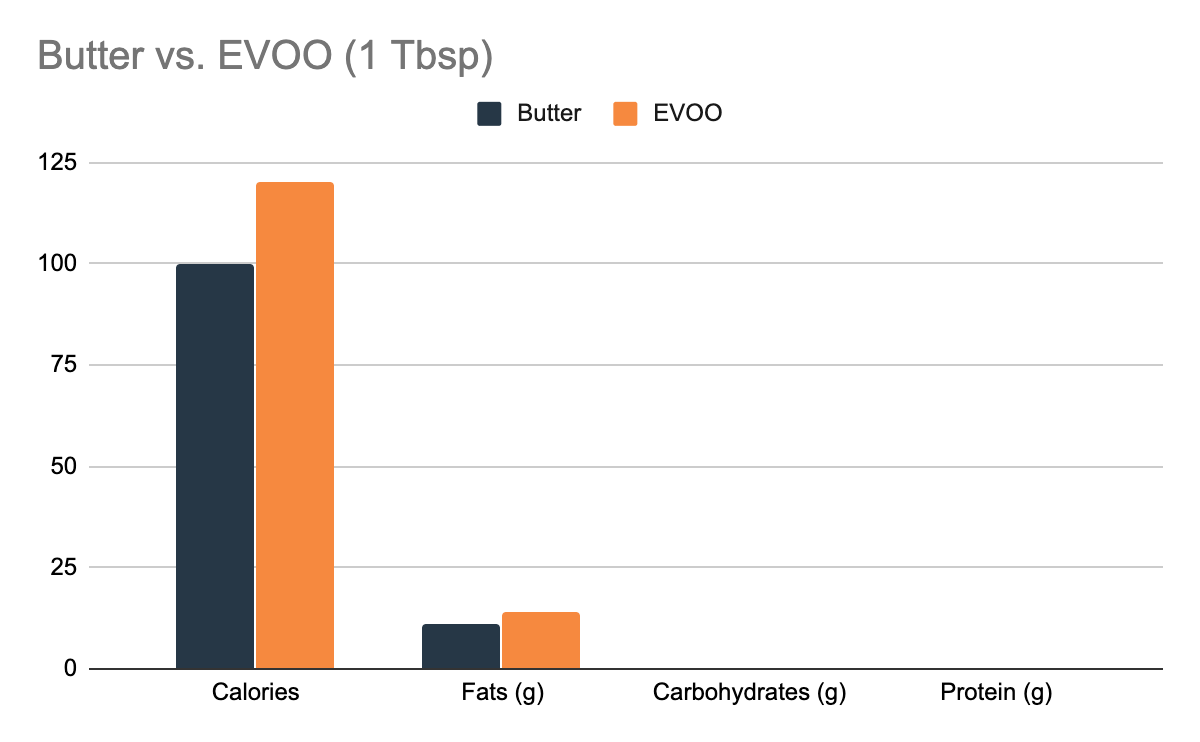
100 calories, 11g F, 0g C, 0g P (21) vs. 120 calories, 14g F, 0g C, 0g P (22)
Cheese Alternative
7. Cashew Cheese
Tasting cashew cheese for the first time, it’s hard to believe you’re eating cheese from the nut of a type of tropical apple.
The secret is nutritional yeast, a dried yeast that mimics the tangy taste of cheese. Blended with the raw cashews into the consistency of peanut butter and thickened with water (yes, water thickens nut butters), cashew cheese has the flavor of a mild boursin. Making it with agar agar powder, yields a semi hard cheese resembling muenster or gouda.
Although it contains little to no protein, you can still get your cheese flavor fix and a small dose of plant based nutrition.
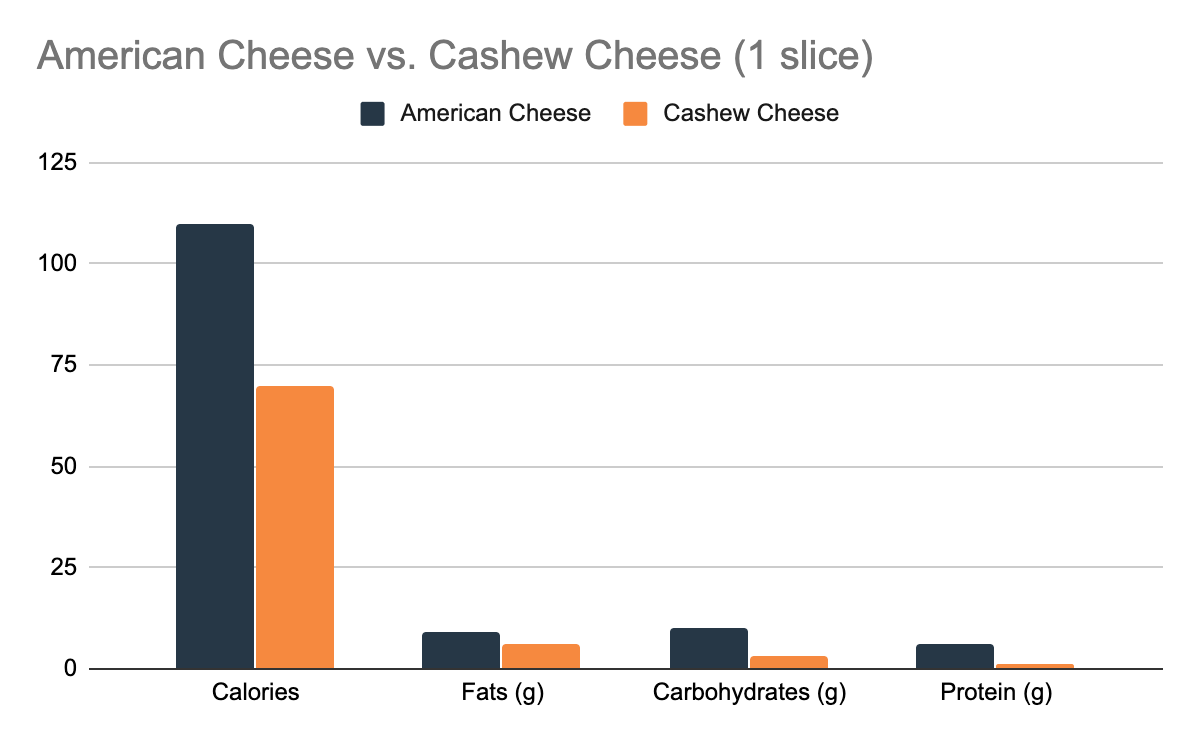
110 calories, 9g F, 10g C, 6g P (23) vs. 70 calories, 6g F, 3g C, 1g P (24)
Ice Cream Alternative
8. Bananas
Lots of ice cream companies are churning out dairy free alternatives using ingredients like almond milk, coconut milk and sunflower butter.
But if you don’t want store-bought ice cream and don’t have an ice cream maker at home, bananas are an excellent stand in. Blended frozen bananas are a naturally sweet low fat treat that’s high in vitamins and customizable with other fresh fruits or toppings.
You won’t get much protein out of them but chances are that’s not why you were craving ice cream to begin with.
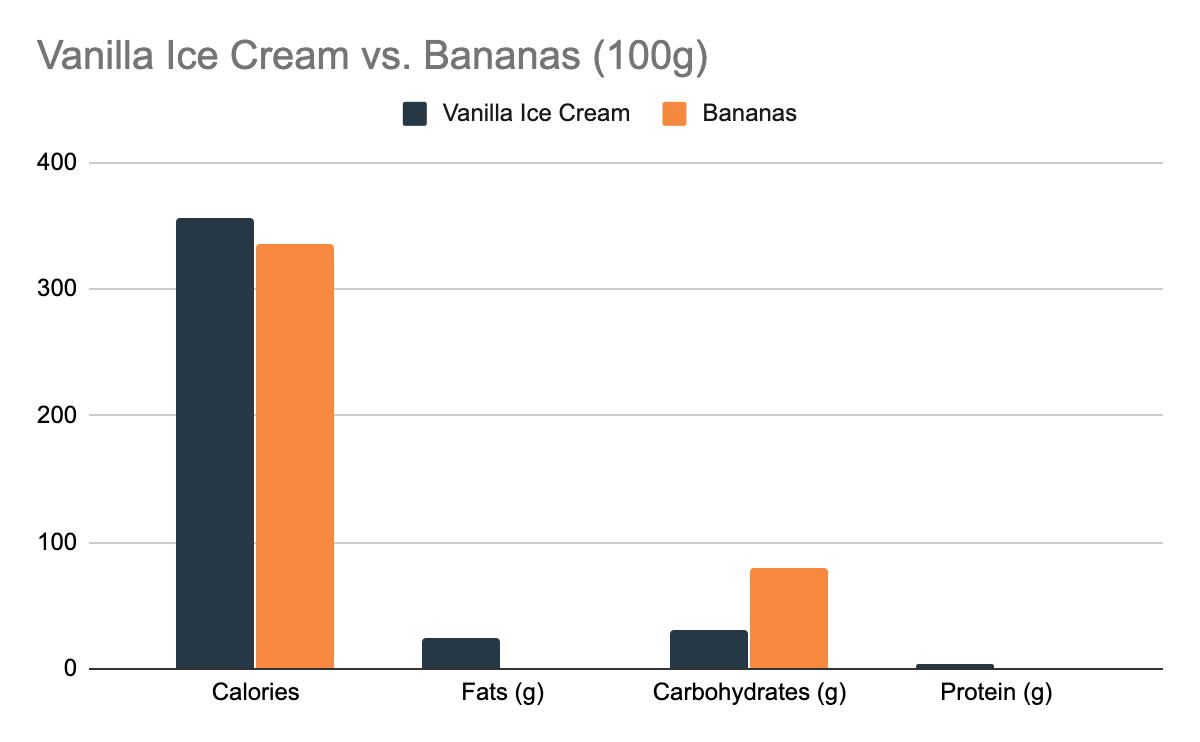
356 calories, 25g F, 30g C, 4g P (25) vs. 336 calories, 1g F, 79g C, 0g P (26)
Dairy Free Meal Prep
Sometimes sticking to a particular diet is less about what you have to eat than what you have to give up. Bacon, bread, booze, these are dear to people.
Dairy certainly has its passionate enthusiasts (shoutout to the cheesemongers) but dairy has never been easier to replace. From your morning coffee to a comforting dessert at night, there are nutritious substitutes ready to step up, with flavor to match and health and environmental bona fides traditional dairy milk can’t touch.
Curious about going 100% plant based but not sure where to start? Download this free meal prep toolkit for vegan diets! This RD-written guide provides step by step instructions for planning vegan meals to help you lose weight and improve your health.
